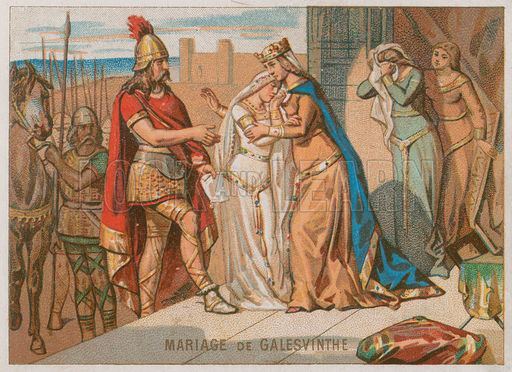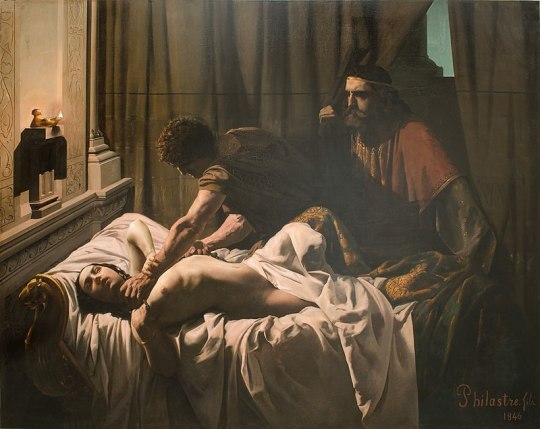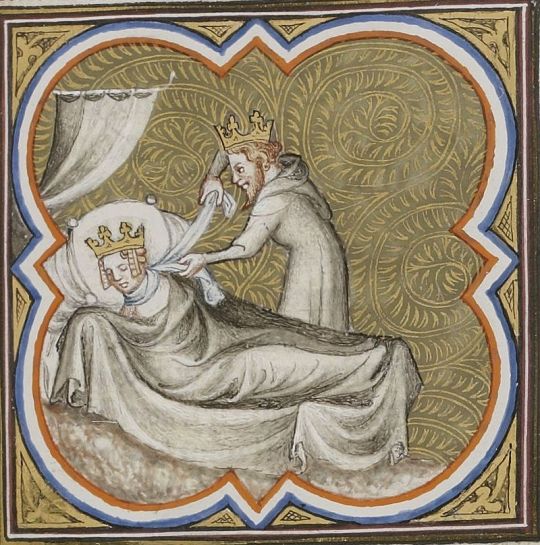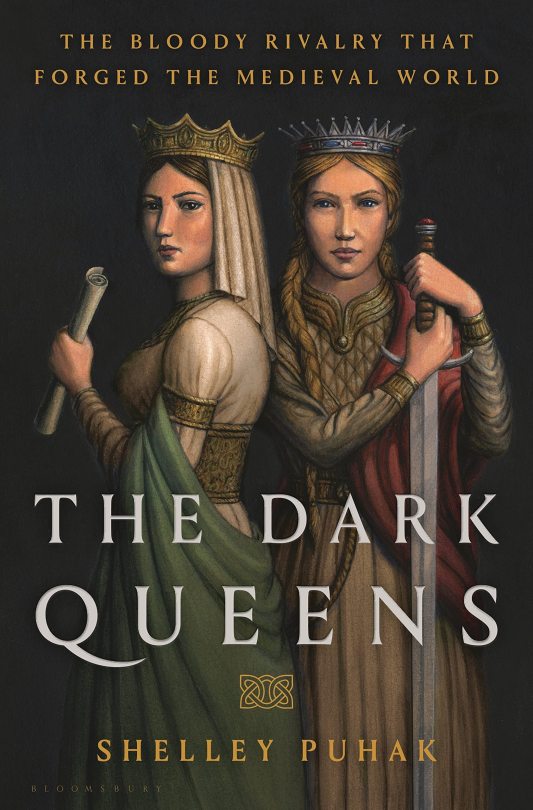#fredegund and brunhild
Text
Some books are a good example of why popular histories are very good when they're good and when they're bad they're wretched:
This book is a good exemplar of what I would unkindly call the 'white feminist' school of women's history or still more unkindly the Third Wave school. Why? Because it bemoans the absence of a history of women in power as offering little to the imagination and then describes a standard medieval history of treachery, internecine warfare, and brutality on a grand scale whose main distinction, and this is admittedly the point on which everything rests....is that it was between two women.
It does, however, vastly oversell a point by claiming that this is an era of women in power when these are not European Wu Zetians, though there would be such women in the 18th Century which much better fits this image between Russia and Austria, but more in the line of Dowager Empress Cixi. Women who held power from men, however tenuous the claims, and were ideologically and personally unwilling to go so far as to implement it in their own rights.
For that matter though her war was at best a stalemate the 'Empress' Matilda, the real first Queen of England, could have qualified for what this book wants to claim was there more than Brunhild and Fredegund do in the real world. Deeds that are wretched and deplorable committed by the various Merovingian kings become laudable done by Queens when the only difference is a woman does the exact same thing a man does, which somehow carries within itself the seed of absolution.
Granted this is a popular history from a poet and not an academic history by a historian trained to actually parse through sources in their own times.....but that also loops right back to 'if a woman does it, it's right, if a man does the exact same thing he's a monster.' Problem is when one invokes morality in politics that undercuts the entire premise as politics, in all eras, is an amoral pattern at best and at worst much more than that.
So while this is an acceptable popular historical refashioning of the framework of someone like Gregory of Tours, it is not a historical work and it should not be treated as such, and instead should be treated as the equivalent of 'I have read very little history and would be perfectly fine with the worst excesses of the Crusades and the like if a woman did them' . Which, of course, will mean if Shelley Punak discovers Eleanor of Aquitaine that another such work will be written where Eleanor would be made into more of a feminist idol in all the ways she wouldn't have seen herself as any more than Brunhild and Fredegund did, and in the eyes of white women of the 21st Century West wanting to reshape the past in the same comfortable ways rich and well to do white people of a specific demographic have done all their lives while not recognizing that the true problem is that this is done at all.
It also admittedly grates me just a bit wrong that this reads as Third Wave feminism in not calling people who sound an awful lot like a medieval proto-trans person in practice by anything approximating that name and clinging to transphobic phrasing and going out of the way to do that for no reason at all.
I wouldn't call it radfem or TERF, however, because it doesn't go all the way with transphobia and because the entire book is a fairly staid 'those were the days' thing right out of the opening of All in the Family.
4/10.
#lightdancer comments on history#book reviews#medieval history#frankish history#fredegund and brunhild
0 notes
Text


Brunhild could not help but be unmoored; her rival had been the one constant in the ever-shifting political waters. Fredegund’s actions had informed her own for the past thirty years. She had grown so used to trying to anticipate Fredegund’s next plot; it would have felt strange to drift to sleep without that worry. Brunhild also felt her age. Nearly every royal, bishop and duke she had worked with or against was gone, replaced by their own children, or by a new family altogether. Brunhild’s political activities in the aftermath of Fredegund’s death were strangely civil. She launched no attacks on Neustria, not even to take back the recently conquered territories. It is unclear whether that was due to bad advice by her military advisers or if Brunhild herself decided to allow Neustria to mourn its queen in peace. But Brunhild could afford to be magnanimous.
Shelley Puhak, The Dark Queens: A gripping tale of power, ambition and murderous rivalry in early medieval
#brunhilde#brunhild#brunhilda#brunegilda#brunequilda#fredegund#french history#women in history#merovingians
46 notes
·
View notes
Text
In the Histories, Brunhild and Fredegund appear as political adversaries and moral opposites. Gregory encouraged his audience to compare the two queens by emphasising their differences. He said nothing bad of Brunhild, yet he accused Fredegund of a great many crimes, including murder, sacrilege, witchcraft, and treason.
…Looking beyond Gregory’s interpretation, Brunhild and Fredegund may not have been so different. Both queens reigned at the side of their husbands and then remained politically influential during their widowhood as mothers of their minor sons. Both formed close, politically useful relationships with some bishops and quarrelled with others. Both cared about the education of their children and made efforts to rescue daughters who fell into the hands of rival powers. They treated their inferiors in a manner befitting a ruler, defending honour and threatening violence much as did kings and other powerful men. Their skilful evocation of both fear and love would have made Machiavelli blush. They donated to the church, venerated the saints, and kept an eye on those who might use illegitimate sources of spiritual power, such as witchcraft or poison, with due attention. Other sources recognised this fundamental similarity: Venantius Fortunatus, ever the dutiful royal client, praised Fredegund and Brunhild alike, while the Chronicles of Fredegar, written from the safety of a later generation, criticised them equally. Yet Gregory insisted they were rivals and moral opposites. His task was not an easy one. Rumours of Fredegund’s misdeeds may have abounded, but stories of Brunhild’s virtues were rather more obscure. Thus, Gregory carefully arranged his material, encouraging his audience to compare the two and to find Brunhild to be the better. Why so complex a narrative strategy? Gregory laboured under burdensome constraints, coming into personal conflict with Fredegund, while finding Brunhild to be a powerful, if intimidating, patron.
-E.T. Dailey, “Queens, Consorts, Concubines: Gregory of Tours and the Women of the Merovingian Elite”
#historicwomendaily#merovingian period#fredegund#brunehilde#brunhild#gregory of tours#women in history#french history#fredegund regina#6th century#merovingian history#queue#my post
14 notes
·
View notes
Text
Even though the Dark Queens were absent from my books, they were in plain sight throughout my childhood as the women I was warned against becoming. The wicked stepmother in my fairy tales, the haughty Jezebel who was preached against in church, the fat lady singing at the opera: all were objects of hatred or ridicule. Between the silence of suppressed history and oppressive blare of stereotypes, what space remains?
- Shelley Puhak, The Dark Queens: A gripping tale of power, ambition and murderous rivalry in early France
#quote#shelley puhak#the dark queens#fredegund#brunhild#narrative nonfiction#french history#women in history#women in power
2 notes
·
View notes
Text
Yeah so whatever fredegund and brunhild had going on… I need that in hotd and/or aspiaf asap!!!! I know GRRM is an english history fanboy but my merovingian blorbos-
1 note
·
View note
Note
Do you think a movie/series/miniseries about the rise of Fredegund and her feud with Brunhilde (and with others, like Praetextatus, Merovech, Audovera and Sigebert) would be a good idea? I think that era is so interesting and not seen in cinemas and TV... When It comes yo the Middle Ages it's all Vikings (dressed like modern motor-bikers), some Crusades and some (unaccurate) English monarchs.
I've talked about it a lot with @queenfredegund and honestly i wouldn't trust anybody with this lmao
3 notes
·
View notes
Note
I was reading through your hashtags on your post abt Nantechildis regina and I noticed you said that she had the makings of another powerful regent so I was curious as to what moves she made that PHD historians like yourself have information on that would have left this impression? Love your merovingian posts and can’t wait for more!!! I blame you for thiss!!! 🤭 you have gotten me obsessed with them 😂 especially fredegunde and brunhilde!!!! 😂 sorry this was just way too long 😂 ok bye 😃
Hi! First of all, when I'm speaking about powerful regents, what I intend is a woman who:
acts as a ruling figure for a minor sovereign, either by being his mother or any other motherly-figure;
has made connections with some powerful allies among the ruling elite or can dispose of family members able to back her up;
is known as an active pious founder.
These are some of the many similarities we can observe from the careers of several Merovingian regent women. For example, Brunehilde was the mother of Childebert II, she had connexions with many powerful men, even being the godmother of the daughter of one of them, and she is known for at least three major religious foundations. Those are the roots of her authoritiy for several decades.
Now, regarding Nantechildis, we can observe that:
she acted as Dagobert's main wife for 10 years, including 5 years without delevering a son, and as soon as Dagobert died, she was regarded as his executrix, managing the parting of his treasure equally between his two heirs. She also managed to enthrone her own son, who was only 5yo, and successfully guided him into a tour of the major cities of his regnum like Dagobert had done this 10 years before;
she had connexions with different political figures, and even managed to marry her own niece to one of the most important leader during her regency, which if you ask me, certainly means that she hosted the wedding and acted as a figure of authority for the newlywed couple;
not only did she founded several pious structures with Dagobert, but she also made major donations before and after his death, and honored her late brother with a lavish ceremony and lavish donations in his memory.
All that put together, I sincerely think Nantechildis could have been a major regent herself, if only she didn't die so early in her regency...
And also, I'm so glad to know that I may have got you interested in Frankish women, cause I love them, haha!
2 notes
·
View notes
Text
I was tagged by @wiwaxia to do last book, current book, next book.
Last book: Pawn in Frankincense by Dorothy Dunnett. This is a reread, and I've been listening to the audiobooks read by David Monteath, which I highly recommend. The rhythm and poetry of Dunnett's prose is beautiful in audio and Monteath is a good narrator with a lovely voice. It's book four of the Lymond chronicles, a series of six historical novels set between 1547-1557. PiF follows our protagonist, Francis Crawford of Lymond and Sevigny in his efforts to defeat his enemy, from Switzerland across North Africa to Istanbul under the rule of Suleiman and Roxelana and concludes with the most nerve-wracking fictional chess game of all time.
Current read: I'm picking my way through a couple of books:
The Dark Queens by Shelley Puhak (sometimes subtitled 'the bloody rivalry that forged the medieval world'). This is a narrative history of the Merovingian queens Brunhild and Fredegund from seventh century France. The book slips into speculation about what historical figures must have thought it believed or felt a bit too often for my comfort - that sort of thing makes my historian brain suspicious and I'm not familiar enough with the subject matter to judge if Puhak is doing her sources justice.
Concepts of Arthur by Thomas Green. This is an examination of the earliest surviving writings about King Arthur. It's written partly in rebuttal of the idea that Arthur was an historical figure - Green argues convincingly from both written and contextual evidence that the earliest sources portray Arthur in a legendary, not a historical manner. In doing so however he has a tendency to repeat himself in his argumentation – and his disdain for the historical interpretation. Possibly a text that could have used a more assertive editor.
Next read: idk. Possibly Ringed Castle by Dorothy Dunnett, book 5 of the Lymond chronicles, but I might need something lighter. I don't really plan ahead much in my reading habits!
Tagging (with absolutely no pressure) @grassangel @verysongof @silentstep and anyone else who's interested.
2 notes
·
View notes
Text
You guys should look up the rivalry between Brunhild and Fredegund. It very much feels like partial inspiration for Martin when it comes to Rhaenyra and Alicent (you can decide who is who)
4 notes
·
View notes
Text
Nor was Clotilde the only one, the early Merovingian Dynasty was a rivalry between two women:
Fredegund and Brunhild, like the Empress Matilda, represented a paradox for the fledging imperial Christian civilization of Western Europe. Officially in Christendom women were not to wield power as they did, in the ways they did, with the effective ruthlessness they did. They elected to ignore this and had more than a few heads roll in the course of their rivalry with each other. This is most bluntly detailed in the writings of Gregory of Tours, a provincial misogynist whose view of the two women was shaped by their being everything he despised.
It's also worth reflecting that this very reality points to the ebb and flow of politics in a time of transition, as we'd see it. Much of what we consider 'medieval' really begins with later centuries that were the result of how these formative years ended. Fredegund won the struggle and built the basis of the state that would be co-opted by the Carolingians, who built the one medieval attempt to try to revive the Western Empire from Western Europe (as opposed to Justinian). Brunhild lost, and Bavaria sank into a dependence on greater Germany that it has grudgingly accepted, tried to reverse, and never quite pulled it off.
#lightdancer comments on history#women's history month#europe and women's history#fredegund and brunhild
0 notes
Text

The Death of Galswintha
Brunhild’s elder sister, Galswintha, arrived in Frankish lands as Chilperic I of Neustria’s betrothed in July of 568, trailed by even more treasure and finery than her sister had been. At Rouen, Chilperic tripped over himself to provide an even more spectacular reception than his brother had given Brunhild. He marched his army more than one hundred miles west, so they might meet his new bride ‘near the curved bed’ of the river Seine as she disembarked from her ship. Rather than being greeted by a palace hall full of nobles, Galswintha was welcomed by Chilperic’s entire army on bended knee, swearing an oath of allegiance to their new queen. Chilperic never did anything in half measure. And Galswintha was married not in the great hall of a converted basilica, but in the cathedral at Rouen.
Less than six months later, though, a third wedding would take place. No cathedral this time, just a handful of nobles quickly assembled in the great room of a royal villa. A week before this third wedding, King Chilperic and Queen Galswintha had been fighting. As she stormed and raged, messengers were seen riding out from the palace at all hours, delivering missives and pleas to her sister and her mother. Galswintha had caught Chilperic in bed, again, with the slave girl Fredegund. The queen was furious that ‘he showed no respect to her at all’; she was distraught over ‘the insults which she had to endure’. She wanted to return home. Was it truly so unendurable? Yes, to be made a fool of like that. And Chilperic had such a temper! She would return home, even if it meant leaving her enormous dowry behind. One morning, soon thereafter, the palace woke to a horrible scene. Galswintha had been found dead in her bed, strangled in her sleep.

Chilperic did not once address his subjects on the matter of Galswintha’s untimely demise. There were no searches for her assailants or rewards offered for their capture. No one was ever questioned or punished, not even the guards who had been posted at the door of the royal bedchamber that night. It was Fortunatus’s friend Gregory who stated plainly what the whole of France was thinking: ‘Chilperic ordered Galswintha to be strangled… and found her dead on the bed.’
Just months after Galswintha’s wedding, Brunhild had received word that her father had dropped dead, presumably of a heart attack. When the next message arrived, this one from Galswintha’s terrified nursemaid, it was reported that Brunhild went into shock. In less than eighteen months, Brunhild had lost her homeland, her father and now her only sibling. At the news of Galswintha’s death, Spain falls into even greater lamentations, and her grieving mother ‘collapses in distress, her knees giving way’ and faints. The enraged mother of the murdered princess was still a major player in international politics; after the death of King Athanagild, she had married his successor.

The few tears Chilperic reportedly shed shortly after Galswintha’s murder may have even been genuine: he was sad that things had come to this. It was nothing personal; Galswintha was simply no longer useful to him. But Fredegund was. Chilperic was obviously incredibly attracted to her. And his attraction also solved several problems. A low-born woman came without the complications of a powerful family; she would be happy with whatever meagre morgengabe he gave her. Three days later, arrayed in the brightly dyed linens and jewels of her predecessor, Fredegund stood at the altar, smiling up at Chilperic.

Galswintha’s murder has been portrayed in art numerous times throughout the centuries since, and the blame always rests on Chilperic, so much so that illuminated manuscripts and paintings portray the king of Neustria himself, wearing his crown and grinning rakishly, wrapping a cloth around the neck of his sleeping wife. In some versions, Fredegund looks on. Whether Fredegund really urged him on or not, she knew people would always assume that she had, cleverly disposing of yet another rival for the king’s affections.
Source:
Shelley Puhak, The Dark Queens: A gripping tale of power, ambition and murderous rivalry in early medieval
#galswintha#chilperic#fredegund#brunhild#brunequilda#brunhilda#brunegilda#french history#merovingians#neustria
14 notes
·
View notes
Photo

Title: The Dark Queens: The Bloody Rivalry That Forged the Medieval World
Author: Shelley Puhak
Series or standalone: standalone
Publication year: 2022
Genres: nonfiction, history, biography, feminism
Blurb: Brunhild was a Spanish princess, raised to be married off for the sake of alliance-building; her sister-in-law Fredegund started out as a lowly palace slave. And yet - in the 6th-century Merovingian Empire, where women were excluded from noble succession and royal politics was a blood sport - these two iron-willed strategists reigned over vast realms for decades, changing the face of Europe. The two queens commanded armies and negotiated with kings and popes; they formed coalitions and broke them; mothered children and lost them. They fought a years-long civil war against each other. With ingenuity and skill, they battled to stay alive in the game of statecraft, and in the process, laid the foundations of what would one day be Charlemagne’s empire. Yet, after Brunhild and Fredegund’s deaths - one gentle, the other horrific - their stories were rewritten, their names consigned to slander and legend.
#the dark queens the bloody rivalry that forged the medieval world#shelley puhak#standalone#2022#nonfiction#history#biography#feminism
3 notes
·
View notes
Text
The misogynistic logic of patriarchy is curiously circular: women cannot govern because they never have. But this big lie rests upon a bed of induced historical amnesia, the work of numberless erasures and omissions, collectively sending the message that the women who have ruled haven’t earned the right to be remembered.
- Shelley Puhak, The Dark Queens: A gripping tale of power, ambition and murderous rivalry in early France
#quote#shelley puhak#the dark queens#fredegund#brunhild#narrative nonfiction#french history#women in history#women in power
2 notes
·
View notes
Note
hi there! i recently found you while i was looking if tumblr had any merowingian period content (not nearly enough imo) and I LOVE YOUR ART! the way you draw historical clothing is *chef's kiss*
Thank you!!! Sorry I don't do anything that specifically merovingian (I'd love to take a stab at Brunhilde and Fredegund sometime tho...) but glad you enjoy!!! Medieval aesthetic and clothing is always a lot of fun...
3 notes
·
View notes
Text

Fredegund, French Frédégonde, (died 596 or 597, Paris), queen consort of Chilperic I, the Merovingian Frankish king of Soissons.Originally a servant, Fredegund became Chilperic’s mistress; she encouraged him to set aside his first wife, Audovera, and to murder his second wife, Galswintha (c. 568). Galswintha, however, was also the sister of Brunhild, the wife of Chilperic’s half brother Sigebert I, king of the eastern kingdom of Austrasia. Galswintha’s murder engendered a violent animosity between Fredegund and Brunhild and an irreconcilable feud of more than 40 years’ duration between the respective families. Fredegund was certainly responsible for the assassination of Sigebert in 575 and made attempts on the lives of Guntram (her brother-in-law and the king of Burgundy), Childebert II (Sigebert’s son), and Brunhild.
After the assassination of Chilperic (584), Fredegund took refuge in the cathedral at Paris. Both she and her surviving three-month-old son, Chlotar II, were at first protected by Guntram, but, when he died in 592, Childebert II, who had taken over his throne, attacked Chlotar, albeitunsuccessfully. From Childebert’s death (595) until her own, Fredegund intrigued on Chlotar’s behalf against Brunhild, who sought to rule through Childebert’s sons, Theodebert II of Austrasia and Theodoric II of Burgundy. Although Ferdegund did not live to see it, Chlotar triumphed over Brunhild (613) and united the Frankish kingdoms under his rule.
#fredegund#queen fredegund#fredegonde#chilperic#merovingian#francia#queen#nina dobrev#historical#history#history edit#early medieval#middle ages#brunhilde#theodoric#chlotar#gregory of tours#childebert#soissons#austrasia#queen regent#Galswintha#frankish#audovera#sigebert#edit
25 notes
·
View notes
